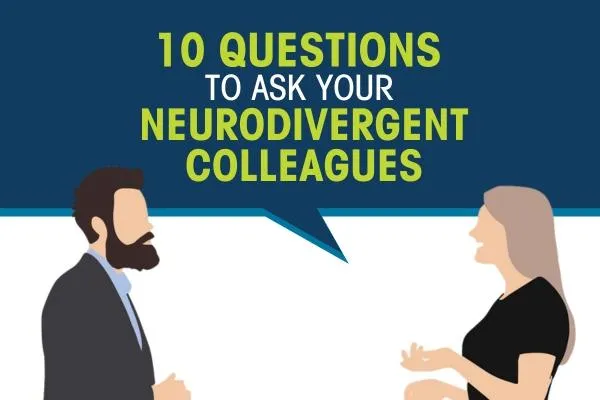Inclusive Change
Start the conversation
Read our blogs and discover more about neurodiversity through our links


10 Questions to ask your Neurodivergent Colleagues
Looking to support a Neurodivergent Colleague but don’t know what to do or where to start? Simple as it may seem, your first step should be to ask them!
There’s no fixed blueprint for how to support a Neurodivergent worker. Yes, there are patterns and stereotypes, for example many ADHDers experience hyperactivity and lots of Autistic people struggle with picking up social cues. But (and we can’t stress this strongly enough), everyone is different. No two neurodivergent people present in exactly the same way. So, one of the best ways you can support your team member in overcoming workplace challenges is to have an open conversation with them about what they are.
To help, here are 10 simple prompts that you can use to help you understand your team’s needs.
Understanding Work Preferences
• How do you prefer to receive information? (E.g., written, verbal, visual)
• Do you find certain types of communication (emails, meetings, instant messaging) easier to process than others?
• Are there any particular tasks or ways of working that help you thrive?
Collaboration & Meetings
• What helps you feel comfortable in meetings? (E.g., having an agenda in advance, taking notes, reducing interruptions)
• Would you find it helpful to have alternative ways to contribute, like follow-up emails instead of speaking up in real time?
Environment & Sensory Needs
• Is there anything about the workspace that makes it easier or harder for you to focus? (Lighting, noise levels, open-plan spaces, etc.)
• Would noise-cancelling headphones, quiet spaces, or flexible working options be beneficial for you?
Support & Inclusion
• What can I do to make our working relationship more comfortable and supportive?
• Are there any workplace adjustments that would help you do your best work?
• How can I be a better ally and advocate for neurodivergent colleagues?
DOs and DON’Ts to Bear in Mind
DO be kind, understanding and patient.
For many neurodivergent people, their workplace challenges may be difficult to talk about. Many mask their struggles to hide them from colleagues, family and friends. It can be very freeing to talk openly in an understanding environment. But this conversation might also be overwhelming. You could try making them aware that you would like to discuss what changes you can make to support them and let them pick how they would like to have this conversation – whether it’s by email, in a private location, one to one, or as part of a group.
DON’T pressure them and DO give them time and space if they need it.
Your colleague may need a bit longer to process their answers or decide what they want to share. It might be that they’ve never had to think or talk about this in the workplace before. Give them space and time to think if they need it. Maybe try following up with an email prompt for any neurodivergent workers who struggle with their memory!
DON’T underestimate them because of their challenges and DO appreciate the unique skills they bring to the table.
Just because someone has challenges that you don’t, it doesn’t make them less valuable to the team. These conversations are designed to support your colleague and help them reach their full potential. Many neurodivergent people have an array of extraordinary and unique skills that are asset to many teams.
DON’T assume that their answers apply to all neurodivergent people and DO keep talking.
It’s worth repeating ourselves here. Everyone is different. There is no one-size-fits-all solution for supporting neurodivergent people in the workplace. Keep having discussions with your team member.
What Next?
So, you’ve identified their challenges. Now time to make changes!
If you need some help identifying what changes you can make to your workplace / way of working to support your colleagues’ unique needs, this is where we can help!
Visit our Work Based Assessments page to find out more about the bespoke evaluation services we offer to help you identify and implement reasonable adjustments that can help individual team members thrive.
Check out Lucy's other features

A Journey of Neurodiversity Advocacy and Change
Read Lucy's interview with Golden Valley, where she explains some of the life events that led her to becoming a full time advocate for neurodivergent and disabled people in the workplace.

Women in the Middle® Entrepreneurs:
EP #52: Sharing the Positives About Neurodiversity with Lucy Smith
Suzy Rosenstein, a master life coach, hosts a podcast called Women in the Middle Entrepreneurs, a podcast where these important conversations about the intersection of being a midlife entrepreneur who's also a woman 50 plus can happen.
Inclusive Change Ltd
The Brightwell, Bradbury House
Wheatfield Drive
Bradley Stoke, Bristol
BS329DB
Copyright 2025 - Inclusive Change Ltd
Companies House: 12412464
VAT NO: 352 1564 17
ICO Reg: ZB081779
UK Register of Learning Providers: 10090652
Reg no: 12412464




